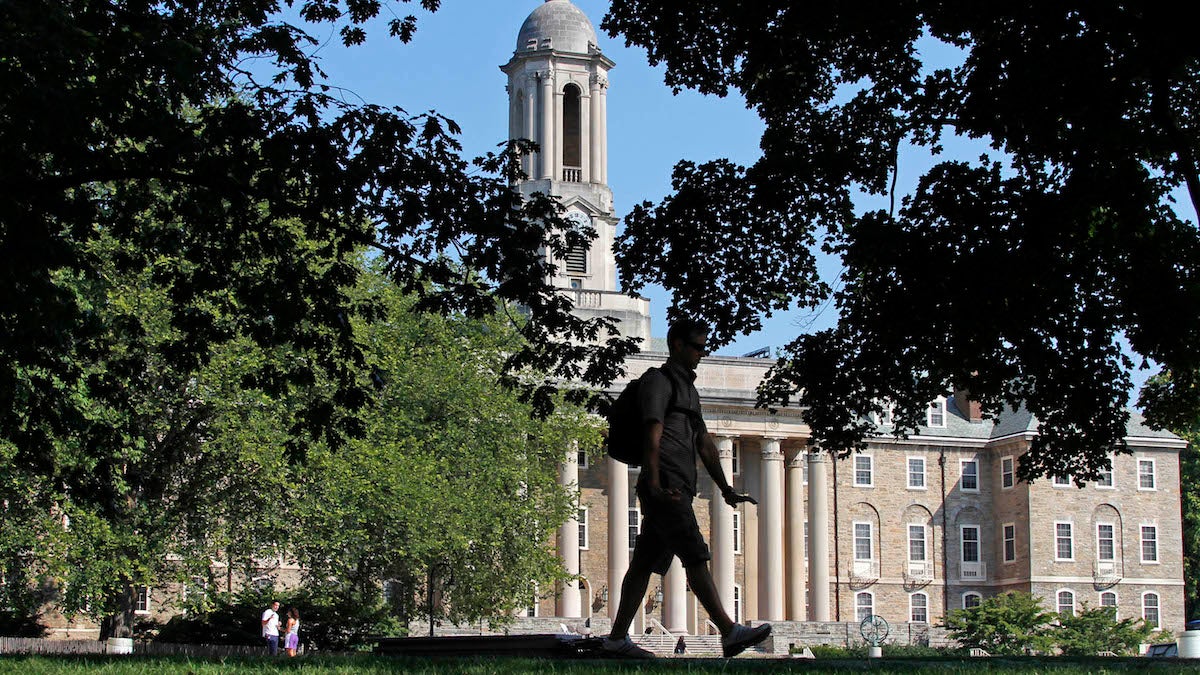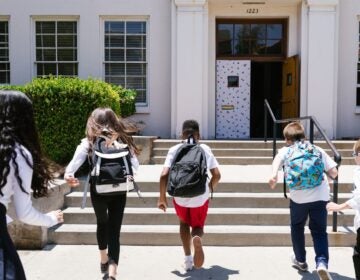Pa. bill aims to make college debt more transparent
The bill would require all colleges and universities to send students annual notices on how much debt they're collecting.

A Penn State University student walks across campus in front of Old Main on main campus in State College, Pa., Thursday, July 12, 2012. (AP Photo/Gene J. Puskar)
Pennsylvania college students graduate with more debt on average than any other state — an average of $35,000.
To help deal with this, the Pennsylvania House of Representatives last week unanimously approved HB 2124, a bill that would require all colleges and universities to send students annual notices on how much debt they’re collecting.
Each institution would be responsible for informing students of the size of their federal education loans and any other loans that are dispersed through the school. It would also include the percentage of the borrowing limit the student has reached.
The Pennsylvania Department of Education would be responsible for administering and enforcing the provisions in the bill, and department officials say with their current staffing, it would be challenging to enforce the program.
Democratic state Rep. Mike Driscoll, a father of five with two in college, is a co-sponsor of the bill.
“I know firsthand that this debt is crippling kids and it’s crippling parents,” he said. “And we have to give full disclosure to these kids, what their obligations are going to be. We as legislators have to get more active in helping these kids.”
Driscoll, who serves Northeast Philadelphia, said students’ first official notice currently comes after they graduate.
He also co-sponsored legislation to bring financial literacy classes to high schools so students can manage their expenses.
Tuition has increased by 66 percent at Pennsylvania’s public universities and more than 50 percent at private colleges since 2000.
“We have to keep this tuition down. Otherwise, we’re going to lose a whole generation of kids who aren’t going to be able to go to college. I think the business model is broken, and we need to fix it,” Driscoll said.
Democratic state Rep. Tina Davis is a mother of three college-age students, and said paying for college is difficult and hopes this bill will make it easier for families to navigate.
“Some kids, especially in my area, they come from one-parent households, a lot of them are doing things on their own and don’t realize where they’re at in their careers with finances,” said Davis, whose district includes part of Bucks County. “I think it’s important to be transparent with costs.”
Democratic state Sen. Vince Hughes, who supports the bill, said it’s one vehicle to help tackle student debt.
“It’s smart legislation, informing students, and obviously family members as well, what their financial situation is with respect to one of the most important investments that they’re going to make in their career and their life. I think it’s wise.”
But Hughes says the bill doesn’t tackle the main problem facing students.
“The real solution is combating the inflation that’s occurred in college and also more importantly putting up more dollars, both I believe at the state and the federal level, but especially at the state level.”
Mark Price, a labor economist for the Keystone Research Center, agrees that dramatically higher tuition costs are driving student debt.
“They’ve absolutely put their finger on a serious problem that a lot of students and their parents are concerned about,” said Price. Student loan debt, he added, is up about 25 percent for students in public colleges in the Commonwealth since 2002.
Instead of finding a way to bring costs down, Price says this bill blames students and their parents for “making bad choices” by taking on too much debt. If lawmakers really wanted to solve the problem, Price said, the General Assembly would boost funding for higher education.
“It’s an attempt to sort of shift responsibility from the General Assembly on to students, sort of suggesting that they’re being irresponsible in their decisions when in reality what they’re doing is they’re reacting to the price of actually getting into college.”
But Senator Hughes says the state is making some efforts to bring relief to students. Hughes says there is bipartisan work, along with state Treasurer Joe Torsella, to create a 529 program, a tuition assistance plan for every Pennsylvania student, as well as the PA Promise legislation, which is planned to be introduced later this month, meant to create tuition-free experiences for qualifying families at public colleges.
The bill is now under consideration in the Senate.
WHYY is your source for fact-based, in-depth journalism and information. As a nonprofit organization, we rely on financial support from readers like you. Please give today.




